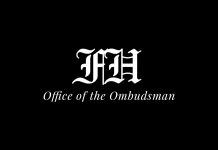The International Law Society hosted a symposium to discuss the use of smart power in U.S. national security strategy Oct. 16 at the William and Mary Law School.
The symposium featured panelists representing the White House, the military, civil society and academia. Speakers discussed President Barack Obama’s 2010 National Security Strategy, which emphasizes respect for human rights and the rule of law, and works to improve the effectiveness of the criminal justice system in order to make the country more secure from threats.
According to the panel, one of the most important aspects of the Obama administration’s National Security Strategy was the application of “smart power.” Panelists described smart power as the integration of diplomatic, economic, military, political, legal and cultural tools for particular situations, instead of the use of exclusively military power to ensure national security.
The recent creation of the Office for Rule of Law and International Humanitarian Policy within the Department of Defense is one result of the implementation of this policy.
The first of three panels discussed emerging national security threats, and featured Peter Belk, adjunct professor at the Public Policy Institute at Georgetown University, and Neal Pollard, adjunct professor of microbiology and immunology at Georgetown University Medical Center.
Possible threats to the country’s national security include climate change, pandemics, biological warfare and cyber warfare.
During the second panel, Michael Maya, the deputy director of the American Bar Association’s Rule of Law Initiative, and Colonel Ross Woodley, the director of Washington Operations of the U.S. Joint Forces Command, discussed the civil society perspective of national security, as well as potential security threats in the future.
The third panel, featuring Scott Carlson, senior rule of law advisor in the Office of Criminal Justice Assistance and Partnerships at the Department of State, and Charles J. Brown, senior fellow and Washington director of the Institute for International Law and Human Rights, discussed the implementation of smart power strategies within the Department of State and the Department of Defense.
Major General Charles J. Dunlap Jr. gave the keynote address and stressed that every situation in national security must be approached individually to best address the threat.
According to Dunlap, in order to effectively apply national security strategy, civilian abilities must be strengthened in addition to those of the military abroad. He also noted that people must understand cultural relativism while implementing strategy.
“Smart power needs to be applied everywhere,” Dunlap said. “We need to not only emphasize the rule of law, but also recognize the unique history and values of other cultures when applying national security strategy.”
Dunlap’s speech was the only portion of the symposium which was allowed to be quoted.



































